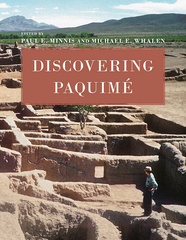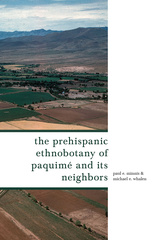
Reframing Paquimé
Community Formation in Northwest Chihuahua
Reframing Paquimé: Community Formation in Northwest Chihuahua is a groundbreaking reinterpretation of the Casas Grandes region by scholars Michael E. Whalen and Paul E. Minnis. This final installment in their comprehensive study challenges the dominant view of Paquimé as a hierarchical society founded by outsiders, presenting instead a compelling case for a largely locally organized society with Mesoamerican and Puebloan characteristics. Drawing on twenty-five years of extensive survey and excavation data, the authors offer a fresh perspective that reframes our understanding of this remarkable archaeological site.
Whalen and Minnis bring forth significant new data that illuminates the cultural and ecological history of Paquimé and its neighboring communities. The book features more than fifty new radiocarbon dates, hundreds of analyzed archaeobotanical and faunal samples, plus tens of thousands of other artifacts. The data reveal a network of settlements characterized by corporate and ritual-based authority, challenging traditional models of the center’s rise, collapse, and subsequent regional abandonment and arguing that aspects of the Paquimé culture continued to exist up to the Spanish Colonial period.
Reframing Paquimé is poised to become an essential reference for archaeologists interested in Northwest Mexico and the U.S. Southwest. By addressing the complex dynamics of community formation and dissolution, Whalen and Minnis provide invaluable insights that will ignite scholarly debate and inspire future research. This meticulously researched volume, authored by leading experts with decades of fieldwork experience, is a vital addition to any collection on the archaeology and ethnobotany of ancient North American societies.
Ancient centers of large-scale population aggregation, always coupled with ritual innovation, are rarely found north of Mesoamerica—yet they are essential in the story of Indigenous North America. In a ground-breaking study of one of these centers, this volume scrutinizes new excavation data from six sites a few kilometers from the astonishing World Heritage ruin of Paquimé. The result is an unprecedented understanding of the development, maintenance, and conclusion of the Paquimé community.'—John E. Douglas, University of Montana
'Michael Whalen and Paul Minnis provide the third and final installment of their massive reinterpretation of the inner workings of the Casas Grandes region. This volume takes on the essential question of how Paquimé affected its near neighbors and also addresses the enigmatic end to the great city. The volume is poised to become an essential text that will generate debate for a generation of future scholars of Northwest Mexico and the adjacent US Southwest.'—Matthew Pailes, co-author of Hinterlands to Cities: the Archaeology of Northwest Mexico and Its Vecinos
Ancient centers of large-scale population aggregation, always coupled with ritual innovation, are rarely found north of Mesoamerica—yet they are essential in the story of Indigenous North America. In a ground-breaking study of one of these centers, this volume scrutinizes new excavation data from six sites a few kilometers from the astonishing World Heritage ruin of Paquimé. The result is an unprecedented understanding of the development, maintenance, and conclusion of the Paquimé community.'—John E. Douglas, University of Montana
'Michael Whalen and Paul Minnis provide the third and final installment of their massive reinterpretation of the inner workings of the Casas Grandes region. This volume takes on the essential question of how Paquimé affected its near neighbors and also addresses the enigmatic end to the great city. The volume is poised to become an essential text that will generate debate for a generation of future scholars of Northwest Mexico and the adjacent US Southwest.'—Matthew Pailes, co-author of Hinterlands to Cities: the Archaeology of Northwest Mexico and Its Vecinos
Ancient centers of large-scale population aggregation, always coupled with ritual innovation, are rarely found north of Mesoamerica—yet they are essential in the story of Indigenous North America. In a ground-breaking study of one of these centers, this volume scrutinizes new excavation data from six sites a few kilometers from the astonishing World Heritage ruin of Paquimé. The result is an unprecedented understanding of the development, maintenance, and conclusion of the Paquimé community.'—John E. Douglas, University of Montana
'Michael Whalen and Paul Minnis provide the third and final installment of their massive reinterpretation of the inner workings of the Casas Grandes region. This volume takes on the essential question of how Paquimé affected its near neighbors and also addresses the enigmatic end to the great city. The volume is poised to become an essential text that will generate debate for a generation of future scholars of Northwest Mexico and the adjacent US Southwest.'—Matthew Pailes, co-author of Hinterlands to Cities: the Archaeology of Northwest Mexico and Its Vecinos
Michael E. Whalen is a professor emeritus in the department of anthropology at the University of Tulsa. His research interests include complex societies, processes of sociocultural evolution, prehistoric social structure, and ceramic analysis.
Paul E. Minnis is a professor emeritus of anthropology at the University of Oklahoma now living in Tucson, Arizona, where he is a visiting scholar in the School of Anthropology at the University of Arizona. He is the author or editor of fifteen books, including Famine Foods: Plants We Eat to Survive, and numerous articles.












